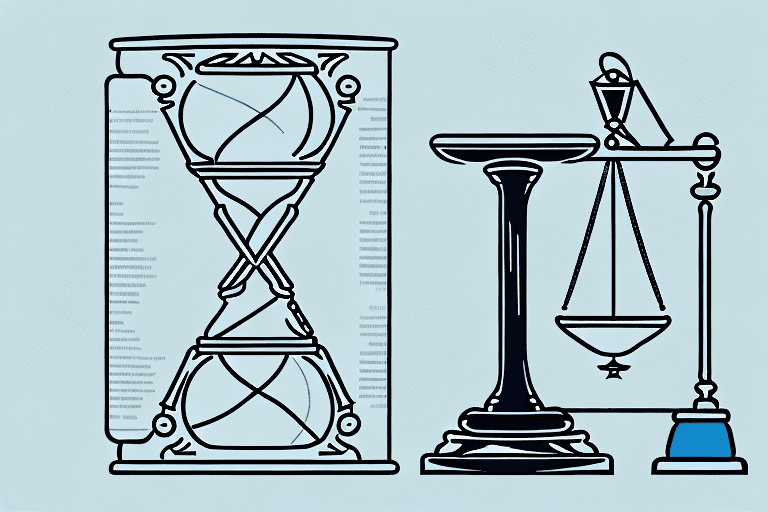Studying for the bar exam is a crucial step on the path to becoming a licensed attorney. To adequately prepare for this challenging test, it is essential to determine how long to allocate for studying. However, the answer to this question can vary depending on several factors. Understanding the structure and importance of the bar exam, as well as considering personal factors and effective study techniques, can help in determining the optimal study timeframe. Additionally, finding a balance between study and other responsibilities is vital for success.
Understanding the Bar Exam
The bar exam is a comprehensive examination that assesses an individual’s knowledge and understanding of the law. It is a rigorous test that determines whether a person is qualified to practice law and become a licensed attorney. The exam is typically divided into two parts: the Multistate Bar Examination (MBE) and the state-specific portion.
The MBE is a challenging component of the bar exam that consists of multiple-choice questions. These questions cover various legal topics, including constitutional law, contracts, criminal law, evidence, and torts, among others. The MBE tests a candidate’s ability to analyze legal issues, apply legal principles, and make sound judgments.
The state-specific portion of the bar exam focuses on the laws and regulations specific to the jurisdiction in which the exam is taken. This portion may include essay questions, performance tests, or both, depending on the state. It requires candidates to demonstrate their knowledge of the state’s legal system, statutes, and case law.
The structure of the bar exam plays a significant role in determining the appropriate study duration. Candidates must allocate sufficient time to prepare for both the MBE and the state-specific portion. They need to develop a study plan that covers all the necessary topics and allows for ample practice and review.
The Structure of the Bar Exam
The bar exam is typically administered over a two-day period. On the first day, candidates usually sit for the MBE, which consists of around 200 multiple-choice questions. These questions are designed to assess a candidate’s understanding of fundamental legal principles and their ability to apply them to various scenarios. The MBE is a comprehensive test that covers a wide range of legal topics and requires candidates to think critically and analyze complex legal issues.
The second day of the bar exam typically covers the state-specific portion. This portion may include essay questions, performance tests, or both, depending on the jurisdiction. Essay questions require candidates to write coherent and well-structured responses to legal scenarios or hypothetical situations. Performance tests assess a candidate’s ability to complete specific legal tasks, such as drafting legal documents or analyzing a set of facts to provide legal advice.
Preparing for the bar exam requires candidates to develop strong analytical and writing skills. They must be able to analyze legal issues, identify relevant laws and regulations, and articulate their arguments effectively. Additionally, candidates need to familiarize themselves with the specific laws and regulations of the state in which they plan to practice law.
The Importance of the Bar Exam
The bar exam is a critical requirement for becoming a licensed attorney. It serves as a gatekeeper to the legal profession, ensuring that individuals entering the field possess the necessary knowledge and skills to serve their clients effectively and uphold the principles of justice within their respective jurisdictions.
Passing the bar exam opens up various career opportunities in the legal field. It allows individuals to practice law, represent clients in court, and provide legal advice and guidance. Whether aspiring to work in a law firm, government agency, or as a solo practitioner, passing the bar exam is an essential step towards a successful legal career.
Moreover, the bar exam is not only a test of legal knowledge but also a test of perseverance and dedication. The preparation process can be demanding and time-consuming, requiring candidates to devote countless hours to studying, reviewing, and practicing. Successfully navigating the bar exam demonstrates a candidate’s commitment to the legal profession and their ability to handle the challenges that come with it.
In conclusion, the bar exam is a comprehensive assessment that evaluates an individual’s understanding of the law and their ability to apply legal principles to real-world scenarios. It is a challenging test that requires candidates to demonstrate their knowledge, analytical skills, and writing abilities. Passing the bar exam is a significant milestone in a legal career, opening doors to a wide range of opportunities in the legal field.
Factors Influencing Study Duration
Several factors play a role in determining how long to study for the bar exam. These factors include personal learning style, previous legal knowledge, time availability, and the importance of maintaining a healthy work-life balance. Understanding these factors can help individuals create effective study plans and budgets, while also ensuring their overall well-being during this challenging period.
Personal Learning Style
Everyone has a unique learning style. Some individuals may excel at self-study, while others may prefer a structured classroom environment or group discussions. Recognizing one’s preferred learning style can help in selecting appropriate study materials and techniques, ultimately maximizing study efficiency. For example, visual learners may benefit from using flowcharts and diagrams to understand complex legal concepts, while auditory learners may find it helpful to record themselves explaining legal principles and listen to the recordings during study breaks.
Previous Legal Knowledge
Individuals with prior legal knowledge or experience may require less time to study for the bar exam compared to those starting from scratch. For example, law school graduates may already be familiar with basic legal principles and concepts covered on the exam. This familiarity can help in allocating study time efficiently, allowing individuals to focus on more challenging areas of the law. However, it is important to note that even individuals with previous legal knowledge will still need to dedicate significant time to review and reinforce their understanding of the exam’s content.
Time Availability
The amount of time available for studying is another crucial factor to consider. Full-time students or individuals with less demanding work schedules may be able to dedicate more hours each day to studying for the bar exam. On the other hand, those with part-time jobs, family obligations, or other responsibilities may need to allocate their study time differently. In such cases, it is essential to create a realistic study schedule that takes into account these competing demands. This may involve waking up early or staying up late to study, utilizing weekends and holidays effectively, and seeking support from family and friends to help manage non-study related tasks.
It is also important to remember that study breaks are necessary for maintaining focus and preventing burnout. Taking short breaks during study sessions can help rejuvenate the mind and improve overall productivity. Engaging in activities such as exercise, meditation, or hobbies can provide a much-needed mental break and contribute to a more balanced study routine.
In conclusion, the duration of bar exam study is influenced by various factors, including personal learning style, previous legal knowledge, and time availability. By understanding these factors and incorporating them into a well-planned study strategy, individuals can optimize their study time and increase their chances of success. It is equally important to prioritize self-care and maintain a healthy work-life balance throughout the study period to ensure overall well-being and sustained motivation.
Recommended Study Timeframes
While study duration can vary based on individual factors, there are some recommended timeframes that can serve as starting points for creating study plans. These timeframes offer flexibility and can be adjusted depending on personal circumstances and study progress.
Study Plans for Different Timeframes
For individuals with more extended study periods, such as those who have already graduated from law school but plan to take the bar exam in the future, a study timeframe of four to six months may be appropriate. This allows for a more comprehensive review of the exam’s content and the opportunity to delve deeper into specific subjects.
During this four to six-month study period, individuals can allocate their time to cover each subject thoroughly. They can start by creating a study schedule that outlines the specific topics to be covered each week. This approach ensures a systematic and organized approach to studying, allowing for a balanced review of all subjects.
In addition to the core subjects, individuals can also allocate time for practice exams and review sessions. These practice exams simulate the actual exam environment and help individuals gauge their progress and identify areas that require further attention. Review sessions can be used to revisit challenging topics or clarify any doubts.
On the other side of the spectrum, individuals with limited time availability, such as working professionals or individuals taking the bar exam while employed, may opt for intensive study periods ranging from six to twelve weeks. Focusing on high-yield topics and utilizing efficient study techniques can help maximize learning within a shorter timeframe.
During this intensive study period, individuals need to prioritize the most important topics and concepts. They can identify high-yield subjects by reviewing past exam patterns and consulting with experienced professionals. By focusing on these key areas, individuals can ensure they cover the most critical content within the limited time available.
Efficient study techniques, such as active learning strategies and spaced repetition, can also be employed to optimize learning during this condensed study period. Active learning involves engaging with the material actively, such as through practice questions or group discussions, to enhance understanding and retention. Spaced repetition involves reviewing previously learned material at increasing intervals to reinforce memory and prevent forgetting.
While the study period may be shorter, it is crucial for individuals to maintain a healthy work-life balance during this time. Adequate rest, exercise, and relaxation are essential for maintaining focus and preventing burnout. Creating a realistic study schedule that allows for breaks and leisure activities can help individuals stay motivated and avoid excessive stress.
In conclusion, the recommended study timeframes for preparing for the bar exam can vary depending on individual circumstances. Whether opting for a more extended study period or an intensive study period, it is important for individuals to create a well-structured study plan, prioritize key topics, and employ effective study techniques. By following these recommendations and maintaining a healthy balance, individuals can maximize their chances of success in the bar exam.
Effective Study Techniques for the Bar Exam
Utilizing effective study techniques is crucial for optimizing learning and retention. Here are two key techniques that can help individuals prepare more effectively:
Focused Study Sessions
Breaking study sessions into smaller, focused blocks of time can enhance concentration and absorption of information. Aim for uninterrupted study sessions of around 45-60 minutes, followed by short breaks to recharge. This approach helps maintain focus and prevents burnout.
Practice Exams and Mock Tests
Practice exams and mock tests are valuable tools for familiarizing oneself with the structure and content of the bar exam. These simulate the testing environment and allow for self-assessment. Analyzing strengths and weaknesses based on practice exam results can help individuals allocate their study time more effectively.
Balancing Study with Other Responsibilities
For individuals juggling multiple responsibilities, finding a balance between study and other commitments is crucial for managing stress and ensuring overall well-being.
Work-Life-Study Balance
Creating a realistic study schedule in conjunction with work or other obligations is essential. Allocating dedicated time slots for studying and sticking to the schedule can help maintain equilibrium. Communicating with employers, family members, and friends about the exam’s importance can foster understanding and support during this demanding period.
Stress Management During Bar Exam Preparation
Preparing for the bar exam can be stressful, but implementing stress management techniques can help alleviate anxiety. Engaging in regular physical activity, practicing relaxation techniques such as meditation or deep breathing, and maintaining a healthy diet and sleep schedule are all effective ways to manage stress during this time.
In conclusion, determining how long to study for the bar exam is a personal decision influenced by several factors. Understanding the structure and importance of the exam, considering individual learning style, previous legal knowledge, and time availability, and utilizing effective study techniques can help individuals create effective study plans. Additionally, finding a balance between study and other responsibilities and managing stress are essential elements in ensuring success on the bar exam.











